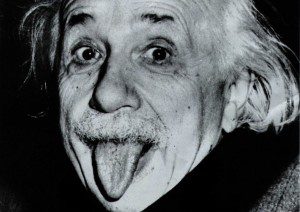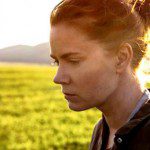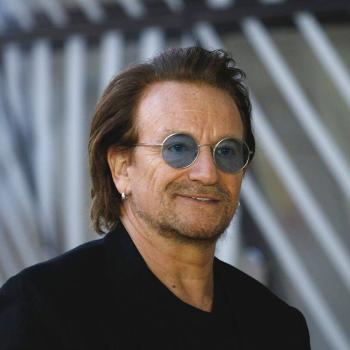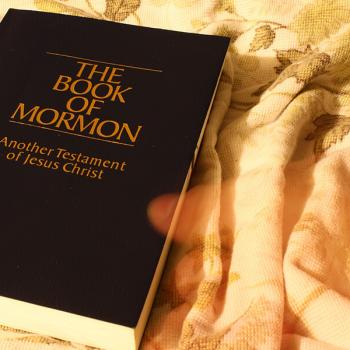by Megan Schmidt
The man who dedicated his life to solving the great mysteries of the universe remains a mystery to most of us.
Although Albert Einstein is probably the most beloved scientist to have ever lived — what do we really know about him? We know his famous formula, e=MC2, that he married his first cousin, and that he had a playful sense of humor — which the public got a glimpse of in this iconic photo of him sticking out his tongue on his 72nd birthday in 1951. But is that all there is to him?
“Genius” Executive producers Ron Howard, Gigi Pritzker and Brian Grazer hope to bring new insight to the public in their new series on the life of the famous physicist. National Geographic’s first ever scripted series is a never-before-seen look into the mind of one of the most revolutionary thinkers of the 20th century.
Instead of focusing on his groundbreaking science, we will delve into his complicated love life, his trials and tribulations, and what it was like for him — a German-born intellectual with Jewish roots — to live through one of the darkest periods in recent human history: WWII and the Holocaust.
Recently, Patheos interviewed Howard and Pritzker on the making of “Genius” as well as an aspect of Einstein’s life that has been subject to much speculation — the faith of Einstein.
Why was it important to tell Einstein’s story — to introduce the audience to the man behind the mind?
Pritzker: He was a human being and a man, but we know him as a caricature on a poster. There’s just so much more to him. He’s such a complex individual and he lived in an interesting time that obviously now has become even more resonate for all of us. I think there’s so much to him and to his life. Not to mention, his discoveries that have changed the way in which we live. He was uniquely suited to delve into and to bring his life to the screen. It’s a time right now when it is even more important for us to understand him as a complex human being and not just a caricature.
It has been said that Judaism is a religion of questions. Do you think his Jewish heritage influenced his approach to his work or way of thinking at all? I can see how that mindset would complement scientific discovery very well. What do you think?
Howard: He didn’t grow up thinking of himself as being particularly religious, but he came from a family of engineers. His father was in the streetlight manufacturing business and his uncle was an electrical engineer — so he certainly he came from a family of thinkers. His father wanted him to be an engineer. But Albert wasn’t as interested in practical application as he was pushing the boundaries of discovery and understanding the physical world around him.
In order to gain admittance into a university, he had to declare a religion. He had attempted to claim “none” but he claimed “Judaism” in that document. Later, I think he began to see the plight of the Jews and the movement toward Israel as a personal responsibility of his and a political necessity. It was more than a real devotion to the theology.
Pritzker: As a Jew myself who is descended from generations of intellectuals who may have called themselves agnostics, I think a lot of us may not be faith-based Jews but are very identified in the way we think of things and our emphasis on education and questioning. It’s very much a part of our DNA. [A tradition of questioning] was certainly in my family. I may not have understood the faith aspect of our religion, but certainly heritage-wise, I felt a strong attachment to my Jewish roots. It is a religion of questions and it has become a culture of questions and questioning.
Everyone is interested in knowing what Einstein really believed about God and religion. In the show, I got the sense that Einstein didn’t like many aspects of religion, but he was comfortable with the idea of a God. Maybe not a personal God, but a God in the sense of something that connected everything. What’s your interpretation of Einstein and his views on God and religion?
Pritzker: It’s so funny — but I think a lot of Jews have a very conflicted relationship with God. That name in it of itself can be a complex one for a lot of Jews.
Quickly and anecdotally — having not grown up in the faith part of our religion, our children ended up going to Jewish day school and I felt the need for them to get some religious education rather quickly. So I started studying with an orthodox rabbi, and the first thing he said to me was, “we’re going to start with Exodus because if I start you with Genesis it’ll take us 15 years to get past it and it’ll complicate your relationship with God.”
I think Einstein — certainly as an intellectual, as a person of Jewish faith — had a complex relationship with God.
Howard: He chose his words especially carefully — he was a very good writer — but he wrote, “God doesn’t play dice with the universe.” In that, he’s making a commitment that he believes there has to be some organizing plan, or principle or guide.
What do you think Einstein would say today about the tensions that seem to be increasing between the scientific world and the religious world?
Howard: Tragic bemusement. He looked around at the politics of the world with real sadness because he viewed it as such a waste of human potential. And yet, he lived an entire lifetime enduring the fall out and pressure of that institutional thought, as well as a political idealism that was often literally threatening to him and his safety.
I think he was also practical about knowing that it is an aspect of the human condition that he hoped we would continue to evolve beyond. He lived and would continue to believe that discovery and science is an important tool in human advancement and in moving beyond the pettiness of that kind of danger.
How do you think Einstein saw the world?
Howard: He viewed the world as beautiful and that the universe was beautiful. There was an element of mystery that just fascinated him and it fueled his drive to discover and make that discovery the priority of his life.
There’s another element of his character that was born out of his logic and principles. He just saw the world a little differently and he just trusted his own logic — whether that was in science or in his personal relationships. When he formed a question and came upon an answer that he trusted and believed in, I think he had to follow that principle and that answer. Should you get involved in policies? Should you use your celebrity to weigh in on these controversial issues — with the rise of Hitler and threat of war and so forth? He didn’t want to politicize himself, but he felt he had to. His principles and logic demanded that he get involved.
Do you think Einstein saw himself as a genius?
Pritzker: No — he’s famously quoted as saying “I’m no Einstein.”
Howard: I think he loved his work and he just believed that as an individual dedicating the amount of time he chose to in the pursuit of answering difficult questions, that he could probably make these discoveries — and he sacrificed a lot for it in his personal life.
How do you hope this show will contribute to Einstein’s legacy?
Pritzker: I hope the show draws more people to the excitement of science, as well as to more people like Einstein. We wanted to make him accessible as a human being rather than an icon or someone that no one else could be. The goal is to [generate interest in] the questioning and the desire to find answers to the natural world — to all the things that inspired Einstein. I think people will watch this and will think they can also ask questions, be curious and go out in the world and find answers. For me, it’s just drawing more people in, understanding who he was, and what his genius really was — curiosity.
What are you particularly proud of about this show — and what didn’t quite align with your vision?
Howard: I’m very proud of the performances — how Geoffery Rush and Johnny Flynn worked together to understand this very nuanced, very detailed and engrossing individual. Seeing these performances — they were really inspiring. As an actor’s director, I really loved working with them on that. I also think the surprises in Einsteins life — the twists and turns, the relationship with several very interesting and strong women, and the role that they played in his life are all going to fascinate people and entertain them as well. I feel very good about it. It was a very ambitious project.
It’s clear that Einstein was much more than a genius. Peer inside the passionate, imaginative and rebellious universe of Einstein on National Geographic starting April 25 at 9 p.m. ET.
Megan Schmidt is a writer and editor at Patheos.














